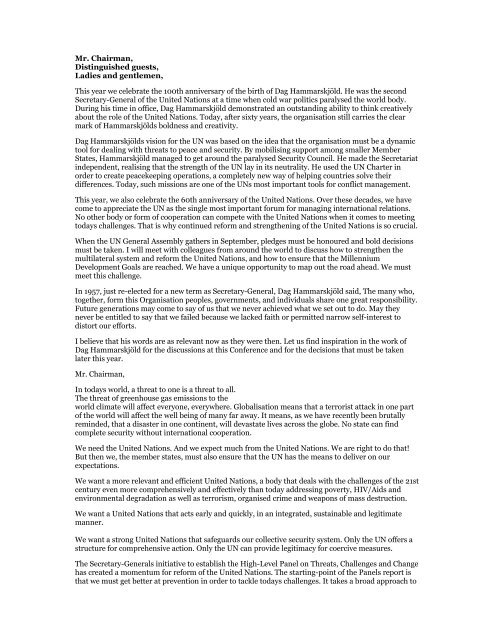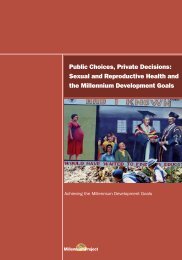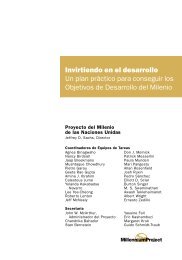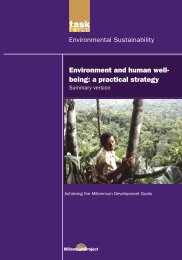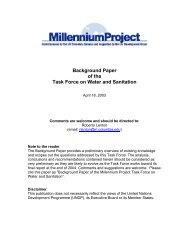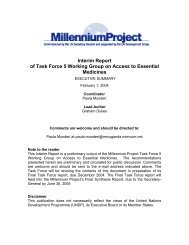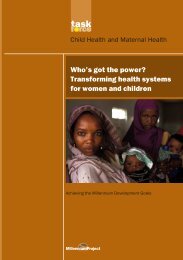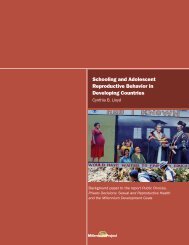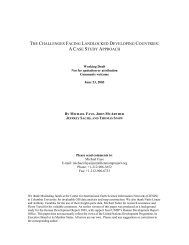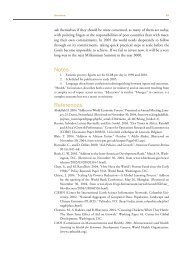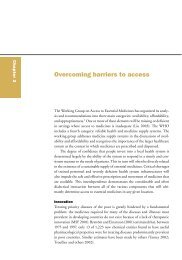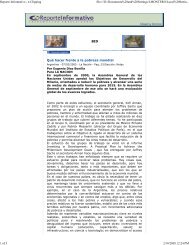Mr. Chairman, Distinguished guests, Ladies and gentlemen, This ...
Mr. Chairman, Distinguished guests, Ladies and gentlemen, This ...
Mr. Chairman, Distinguished guests, Ladies and gentlemen, This ...
Create successful ePaper yourself
Turn your PDF publications into a flip-book with our unique Google optimized e-Paper software.
<strong>Mr</strong>. <strong>Chairman</strong>,<br />
<strong>Distinguished</strong> <strong>guests</strong>,<br />
<strong>Ladies</strong> <strong>and</strong> <strong>gentlemen</strong>,<br />
<strong>This</strong> year we celebrate the 100th anniversary of the birth of Dag Hammarskjöld. He was the second<br />
Secretary-General of the United Nations at a time when cold war politics paralysed the world body.<br />
During his time in office, Dag Hammarskjöld demonstrated an outst<strong>and</strong>ing ability to think creatively<br />
about the role of the United Nations. Today, after sixty years, the organisation still carries the clear<br />
mark of Hammarskjölds boldness <strong>and</strong> creativity.<br />
Dag Hammarskjölds vision for the UN was based on the idea that the organisation must be a dynamic<br />
tool for dealing with threats to peace <strong>and</strong> security. By mobilising support among smaller Member<br />
States, Hammarskjöld managed to get around the paralysed Security Council. He made the Secretariat<br />
independent, realising that the strength of the UN lay in its neutrality. He used the UN Charter in<br />
order to create peacekeeping operations, a completely new way of helping countries solve their<br />
differences. Today, such missions are one of the UNs most important tools for conflict management.<br />
<strong>This</strong> year, we also celebrate the 60th anniversary of the United Nations. Over these decades, we have<br />
come to appreciate the UN as the single most important forum for managing international relations.<br />
No other body or form of cooperation can compete with the United Nations when it comes to meeting<br />
todays challenges. That is why continued reform <strong>and</strong> strengthening of the United Nations is so crucial.<br />
When the UN General Assembly gathers in September, pledges must be honoured <strong>and</strong> bold decisions<br />
must be taken. I will meet with colleagues from around the world to discuss how to strengthen the<br />
multilateral system <strong>and</strong> reform the United Nations, <strong>and</strong> how to ensure that the Millennium<br />
Development Goals are reached. We have a unique opportunity to map out the road ahead. We must<br />
meet this challenge.<br />
In 1957, just re-elected for a new term as Secretary-General, Dag Hammarskjöld said, The many who,<br />
together, form this Organisation peoples, governments, <strong>and</strong> individuals share one great responsibility.<br />
Future generations may come to say of us that we never achieved what we set out to do. May they<br />
never be entitled to say that we failed because we lacked faith or permitted narrow self-interest to<br />
distort our efforts.<br />
I believe that his words are as relevant now as they were then. Let us find inspiration in the work of<br />
Dag Hammarskjöld for the discussions at this Conference <strong>and</strong> for the decisions that must be taken<br />
later this year.<br />
<strong>Mr</strong>. <strong>Chairman</strong>,<br />
In todays world, a threat to one is a threat to all.<br />
The threat of greenhouse gas emissions to the<br />
world climate will affect everyone, everywhere. Globalisation means that a terrorist attack in one part<br />
of the world will affect the well being of many far away. It means, as we have recently been brutally<br />
reminded, that a disaster in one continent, will devastate lives across the globe. No state can find<br />
complete security without international cooperation.<br />
We need the United Nations. And we expect much from the United Nations. We are right to do that!<br />
But then we, the member states, must also ensure that the UN has the means to deliver on our<br />
expectations.<br />
We want a more relevant <strong>and</strong> efficient United Nations, a body that deals with the challenges of the 21st<br />
century even more comprehensively <strong>and</strong> effectively than today addressing poverty, HIV/Aids <strong>and</strong><br />
environmental degradation as well as terrorism, organised crime <strong>and</strong> weapons of mass destruction.<br />
We want a United Nations that acts early <strong>and</strong> quickly, in an integrated, sustainable <strong>and</strong> legitimate<br />
manner.<br />
We want a strong United Nations that safeguards our collective security system. Only the UN offers a<br />
structure for comprehensive action. Only the UN can provide legitimacy for coercive measures.<br />
The Secretary-Generals initiative to establish the High-Level Panel on Threats, Challenges <strong>and</strong> Change<br />
has created a momentum for reform of the United Nations. The starting-point of the Panels report is<br />
that we must get better at prevention in order to tackle todays challenges. It takes a broad approach to
collective security, it deals with a wide range of threats, <strong>and</strong> it contains bold <strong>and</strong> forward-looking<br />
recommendations on institutional reform. It is an extremely important reform document.<br />
Our view of todays global challenges stretches beyond the traditional conflict between states. It puts<br />
the safety <strong>and</strong> security of human beings at the center. When conflicts <strong>and</strong> natural disasters strike, it is<br />
often the poorest <strong>and</strong> most vulnerable groups in society that are worse affected. In addition, poverty,<br />
hunger, infectious diseases <strong>and</strong> environmental degradation quietly reap more lives every day, than<br />
conflicts <strong>and</strong> natural disasters.<br />
Conflict <strong>and</strong> development are closely interrelated. Without economic <strong>and</strong> social development,<br />
democracy, respect for human rights <strong>and</strong> an equitable distribution of resources, you wont get peaceful<br />
coexistence. On the other h<strong>and</strong>, by eradicating poverty <strong>and</strong> creating a sustainable development, you<br />
will help prevent renewed conflict.<br />
Everyone must take responsibility for a sustainable <strong>and</strong> equitable development. As for Sweden, we<br />
have created a strong instrument through the Governments recently established policy for global<br />
development. It states that all policy areas of government must contribute to this common goal. One<br />
set of measures must not undermine another. We see that happening today on an international scale:<br />
agricultural subsidies, trade barriers <strong>and</strong> debt burdens impact badly on development. We must work to<br />
minimize such inconsistencies.<br />
The report of the High-Level Panel acknowledges very clearly the link between security <strong>and</strong><br />
development. A few weeks ago the report on the Millennium Project was also presented. Both will be<br />
crucial for our work over the coming months. They prove that security <strong>and</strong> development must be<br />
addressed together.<br />
<strong>Mr</strong>. <strong>Chairman</strong>,<br />
I would like to point out a few issues where I think that the High-Level Panel has come out with<br />
particularly interesting proposals.<br />
One of the most innovative ideas is the establishment of a peace-building commission. We need better<br />
tools to support states in fragile post-conflict situations, <strong>and</strong> help them avoid renewed conflict <strong>and</strong><br />
secure a sustainable development. To be successful, peace-building <strong>and</strong> peacekeeping activities should<br />
be planned <strong>and</strong> undertaken in an integrated manner. A peace-building commission will help achieve<br />
this.<br />
We have to develop a strong system of cooperation between regional organisations <strong>and</strong> the United<br />
Nations. Regional organisations should be able to take greater responsibility for security in their parts<br />
of the world. However, the primary responsibility for the maintenance of international peace <strong>and</strong><br />
security should remain with the United Nations.<br />
The High-Level Panel strongly emphasises the collective responsibility to protect civilians in the event<br />
of large-scale violence. I want to emphasise that any responsibility to protect, must be coupled with a<br />
responsibility to prevent.<br />
The report also points out the need for a collective response to terrorism. <strong>This</strong> should inspire all states<br />
to agree on a definition on terrorism. We must join together in fighting this threat to democracy, while<br />
at the same time observing rules of international law.<br />
Peacekeeping <strong>and</strong> peace enforcement operations are today indispensable tools for ending wars <strong>and</strong><br />
creating security. Therefore, it is truly worrying that, according to the Panel, the global supply of<br />
available<br />
peacekeepers is becoming too low to meet the needs<br />
of the United Nations. All developed countries, including Sweden, should take a bigger responsibility<br />
<strong>and</strong> contribute with troops, maintenance <strong>and</strong> training.<br />
A broad international consensus on collective security calls for a Security Council that is legitimate <strong>and</strong><br />
effective <strong>and</strong> with a more fair representation for continents such as Africa, Asia <strong>and</strong> Latin America.<br />
Sweden recognises that there are Member States that have valid arguments supporting their<br />
aspirations for a permanent seat on the Council. We must also take into account the interests of<br />
Member States that greatly contribute to the fulfilment of the objectives of the UN Charter. Reform of<br />
the Security Council is a key element for success. Maximum effort must be put into the search for a
sustainable agreement. At the same time, we should not allow this to hijack other issues<br />
in the process leading to the High Level Meeting in September.<br />
The Economic <strong>and</strong> Social Council also needs to be reformed. It has to become a vital organ for<br />
addressing the links between security <strong>and</strong> development. We support the recommendations in the<br />
High-Level Panel report on transforming ECOSOC to a development cooperation forum <strong>and</strong> an arena<br />
to monitor progress <strong>and</strong> measure Member States commitments to achieve the Millennium<br />
Development Goals. Sweden is ready to contribute with detailed ideas on such a transformation.<br />
<strong>Mr</strong>. <strong>Chairman</strong>,<br />
Hundreds of researchers, practitioners <strong>and</strong> development experts from all over the world have jointly<br />
undertaken to define the best strategies for achieving the Millennium Development Goals by 2015. In<br />
January, the report of the Millennium Project, led by Jeffrey Sachs, was presented. The Project is a<br />
unique endeavour. Most of the key recommendations of the report are well in line with Swedens policy<br />
for global development.<br />
The report argues that the Millennium Development Goals can be reached by 2015, if there are<br />
intensive efforts by all parties. So far, the record in achieving these goals is mixed. Broad regions are<br />
far off track. Changing that will take a strong <strong>and</strong> joint effort from the whole international community<br />
developed <strong>and</strong> developing countries alike. And it will take concrete <strong>and</strong> bold action.<br />
We are willing to take on that challenge. We will give high priority to the report in the ongoing work<br />
within the EU as well as in the governing boards of the UN organizations <strong>and</strong> the Bretton Woods<br />
Institutions.<br />
Active participation from a wide range of actors civil society, the academia <strong>and</strong> the private sector will<br />
be key factors in ensuring that the Millennium Development Goals are reached.<br />
<strong>Mr</strong>. <strong>Chairman</strong>,<br />
Todays Conference brings together actors of such a wide range. I am convinced that you, with the<br />
broad experiences that you bring, will provide valuable input to the discussions on how to strengthen<br />
the United Nations. The result from this Conference will be used in regional seminars <strong>and</strong> local study<br />
forums around Sweden. I am sure that it will lead to increased knowledge of international politics <strong>and</strong><br />
create an even larger commitment within Sweden to the work of the UN.<br />
2005 will be a year of change for the United Nations, provided that all Member States are willing to<br />
accept this challenge. Sweden will assume its responsibility <strong>and</strong> work actively to achieve good results<br />
at the High Level Meeting in September.<br />
Let us be guided by the words of Dag Hammarskjöld in his posthumously published diary Markings:<br />
Never look down to test the grounds before taking your next step; only he who keeps his eyes fixed on<br />
the far horizon will find the right road.<br />
There is no better way to commemorate the memory of Dag Hammarskjöld than by contributing to the<br />
creation of a modern United Nations that has the strength to meet the challenges of the 21st century.<br />
Thank you!


